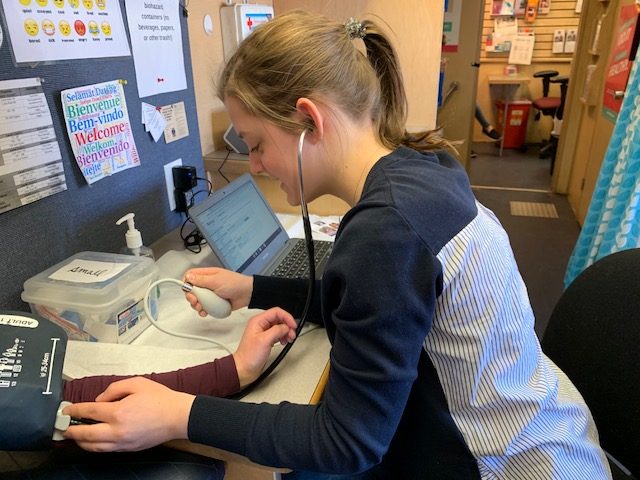IAP Health Reflection: Reed
Serving vulnerable communities in Boston, The Family Van is a mobile health screening clinic that offers routine screenings (blood pressure, blood sugar, cholesterol, STI testing, mental health screenings, etc.). The Van celebrated 28 years of service this year, and I am so grateful to have had the opportunity to volunteer with them this January.
I’m interested in pursuing medicine after graduating from MIT, and joined the Family Van to gain clinical experience, but mostly because I was tremendously moved by their mission, and dedication to treating each patient as the whole person.
Our training emphasized the importance of being aware of one’s own social identity in healthcare work, being fully present and receptive for each patient, and the concept of motivational interviewing: not telling patients how to fix their health, but mutually finding a solution to help them live more healthfully. The Family Van truly takes the time to be with each patient for as long as they need, a model not supported in many other healthcare institutions.
The role of volunteering with The Family Van is multifaceted: interact with patients, conduct outreach, and for my cohort, create a resource map of the communities the van serves. I and my shift partner, Deborah, would see patients, walk around the community handing out flyers and informing people about the van’s services, and record resources for our map all in one shift.

My favorite encounters on the Family Van aren’t, contrary to my initial prediction, the times where I was the perfect healthcare provider: smoothly collecting blood, getting an accurate blood pressure reading the first time, or offering infallible nutrition advice. My memory of encounters are defined not by the services offered, but the people requesting them.
Overwhelmingly, the patients on the Family Van are motivated, positive, and grateful for the opportunity to check on, and talk about, their health. No patient I saw was dismissive when I started a conversation about diet changes, or implementing a new exercise routine. Often times, patients presented their own ideas about how to improve their health, or reported how changes they’ve instituted have impacted their health thus far.
Health was a much higher priority for the populations the Family Van serves than I expected. Often, there is debate about whether communities don’t receive the healthcare they need because of lack of motivation, or lack of access. After working on the van for a week, I could say with 100% certainty that there is no lack of motivation with the people I served.
My last shift on the Family Van, Rainelle White, Assistant Director, joked that I and my cohort had been trained by the “Family Van School of Medicine.” We were trained to meet people where they’re at, whether that’s talking through a realistic new exercise regime, or breaking down what they eat for breakfast. We were trained to start a conversation if someone was lingering after receiving our services. We were trained not to tell our patients how to improve their health, but work with them to develop a solution. We were trained to be kind, receptive, and empathetic.
My most memorable interaction with a patient started like any other. She was new to the Van, so I started asking our new patient questions, starting with her name. That’s where we discovered our first similarity: that we shared a name. I proclaimed that we were name twins, she smiled, and I moved to the next question, date of birth.
She replied with my birthday. When I exclaimed that that was my birthday, she asked “When?” in disbelief. We both were giddy with the coincidence, and that magic of serendipity carried through the rest of our exchange. After completing the screenings, we said our goodbyes (“Goodbye birthday twin!” “And name twin!”), and she went on her way.
While I can’t know the impact our serendipitous moment had on my twin, I know that she was visibly nervous coming on the van, and happy leaving it. Distrust in healthcare is a major issue in many American communities. Multiple patients echoed some of the primary issues: feeling like their doctor ignored them, or being dissatisfied with the amount of time a physician spent with them. The Family Van works hard to ensure that each patient is heard, and feels seen by their staff. I hope that my birthday (and name!) twin felt heard, and returns to the Van when she needs her blood pressure, blood sugar, or cholesterol checked, or if she just needs someone to talk to about her health.
I have learned much from the Family Van staff and patients: lessons in empathy, patience, humility, optimism, motivation. I hope to carry the skills I’ve developed with me to new clinical environments, and treat each patient with the warmth and respect of the Family Van.
Tags: IAP Health 2020
